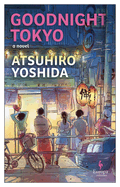
Fate is a slippery character. Assuming one believes in it, fate can be the reason for either disappointment or joyous occasions. Atsuhiro Yoshida plays with this dynamic in Goodnight Tokyo, a moody ensemble piece he calls "a collection of intersecting short stories." Recurring characters in these 12 pieces create a composite portrait of the role that fate and coincidence play in everyday life. The book covers several nights in Tokyo and its environs. Among the characters are Mitsuki, a young woman who enjoys her job as a procurer for a film production company and is asked to find fresh loquats at an all-night supermarket. She calls cabdriver Matsui, who, like everyone else, is in search of something, in his case a woman he once knew.
Another passenger, Shuro, either played a detective in "a series of relatively minor B-movies" or is the actual detective whose escapades have been adapted for film. Matsui hopes Shuro can help find the woman he seeks. Yet another customer is Kanako, who works at a Consultation Room, where she answers calls from lonely souls and, in her own life, seeks the brother who disappeared 12 years earlier. Then there are the women who run an all-night diner, an actress who hates her castmates, and fantastical elements like the character who gets phone calls from an elderly gentleman who died. Yoshida overdoes the fate talk, but the novel has many pleasant episodes and keen observations, such as the way that cabdrivers, like detectives, size up clients before taking them on. The result is a haunting portrait of Tokyo life. -- Michael Magras, freelance book reviewer

